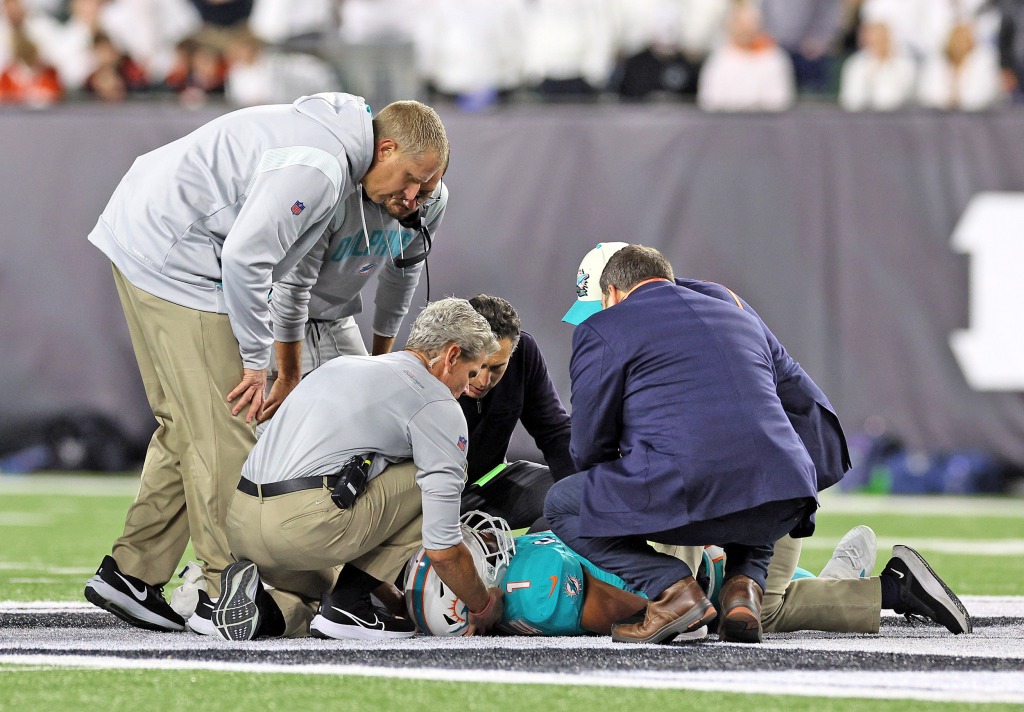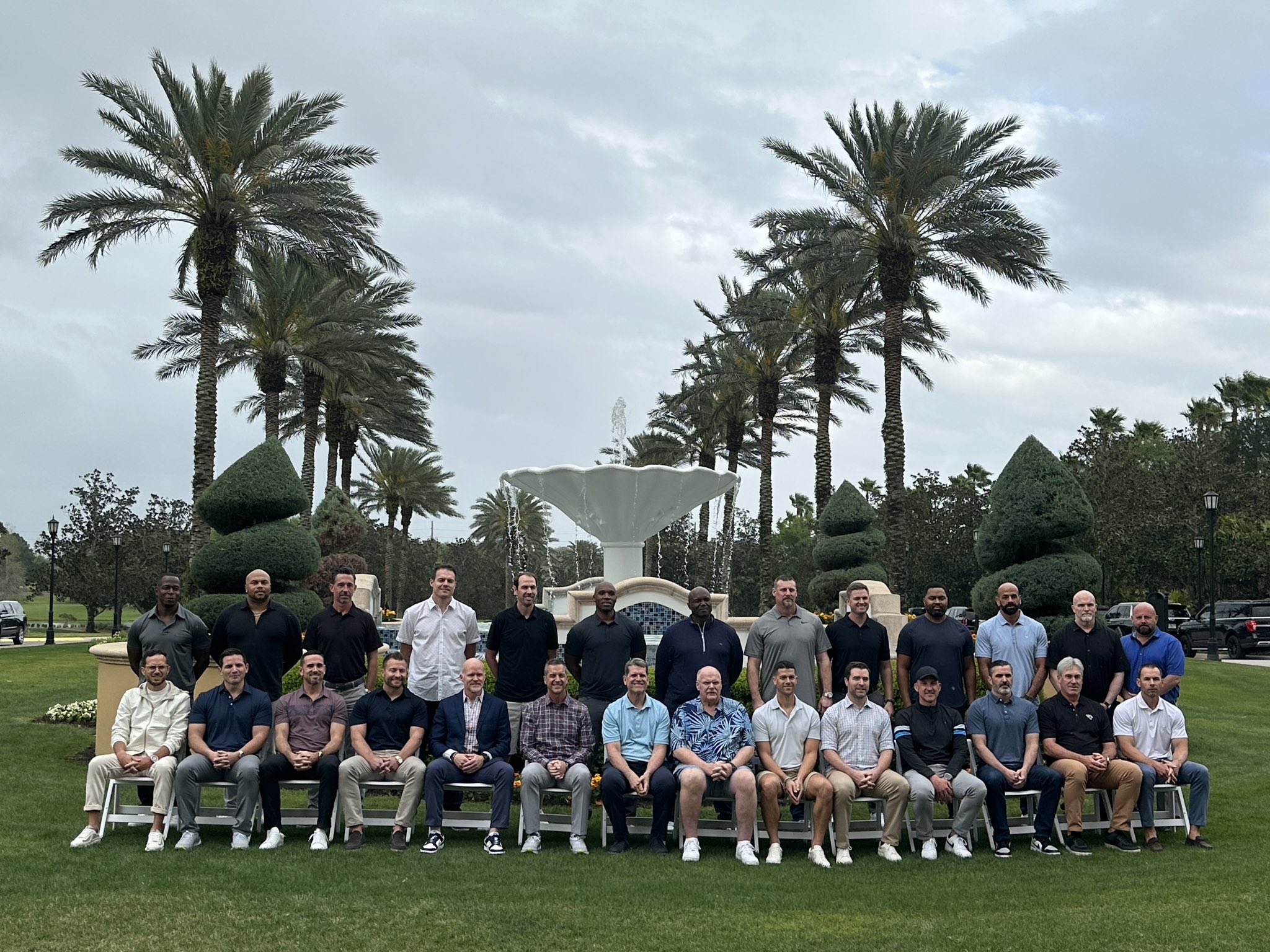In the high-octane world of the NFL, where athletes push their bodies to the limits, the risk of injury is an ever-present reality. Recently, Tua Tagovailoa, the Miami Dolphins’ promising quarterback, faced a harrowing situation that has reignited discussions surrounding player safety, particularly concerning concussions. After taking a hard hit to the head during a game, Tagovailoa was ruled out for the remainder of the match due to a concussion. This incident marks yet another chapter in his tumultuous career, raising critical questions about the long-term health of athletes in contact sports.
The Incident: A Hard Hit and Immediate Consequences
On the fateful day of the game, fans watched in horror as Tagovailoa was struck hard, collapsing to the ground. Fortunately, he managed to walk off the field on his own, a small relief amid the uncertainty. However, the Dolphins quickly announced that he would not return, confirming the diagnosis of a concussion. This incident is particularly alarming given that it is Tagovailoa’s third concussion in his relatively short NFL career, prompting concerns about his future on the field.

The Growing Concern Over Player Safety
The NFL has long been scrutinized for its handling of player safety, especially regarding concussions. As more players come forward with stories of long-term health issues stemming from repeated head injuries, the league faces increasing pressure to implement stricter protocols and protective measures. Tagovailoa’s situation exemplifies this ongoing crisis, as fans and analysts alike question whether enough is being done to protect players from the dangers of concussions.
The Financial Implications of Player Contracts
One of the most contentious topics surrounding Tagovailoa’s situation is the financial aspect of his contract. Critics, including fans and analysts, have voiced their opinions on the Dolphins’ decision to grant him a substantial contract extension despite his concussion history. Joseph Thompson, a vocal critic, stated that the Dolphins made a “huge mistake” in extending Tagovailoa’s contract. This sentiment reflects a broader concern about the league’s priorities, which often seem to prioritize winning over player safety.

The Path Ahead: Should Tua Walk Away?
As discussions about Tagovailoa’s health continue, many are left wondering what the future holds for the young quarterback. With his history of concussions, some experts believe he may need to consider stepping away from the game to prioritize his long-term health. Comments from fans like Kevin Hottle and Nate EM echo this sentiment, urging Tagovailoa to think critically about his future in the sport.
The comparison to former NFL players who have suffered similar fates is inevitable. Troy Aikman, a Hall of Fame quarterback, was forced to retire early due to concussions, leading many to draw parallels between his career and Tagovailoa’s. The irony of Tagovailoa’s situation, particularly in light of the recent incident involving Damar Hamlin, underscores the pressing need for the NFL to address concussion protocols more effectively.

The Role of Equipment in Preventing Concussions
Another critical aspect of the concussion discussion is the equipment used by players. Bryan Eckert raised an important point regarding Tagovailoa’s lack of protective gear, such as guardian caps, which could potentially mitigate the impact of hits. As technology advances, the NFL must stay at the forefront of safety innovations, ensuring that players have access to the best protective equipment available.
The Responsibility of Coaches and Teams
While players must prioritize their health, coaches and teams also bear a significant responsibility in protecting their athletes. The pressure to perform can often lead to players downplaying their injuries or rushing back onto the field before they are fully recovered. This culture of toughness can be detrimental, and it is essential for teams to foster an environment where player safety is paramount.

The Broader Impact on the NFL
Advocating for Change
Advocacy for player safety is gaining momentum, with organizations and former players pushing for reforms within the league. The NFL must take these voices seriously and work towards creating a safer environment for its athletes. This includes revisiting concussion protocols, improving training methods, and ensuring that all players receive the necessary support to recover from injuries.
A Call to Action
Tua Tagovailoa’s latest concussion raises urgent questions about the safety of players in the NFL. As fans, analysts, and former players voice their concerns, it is clear that significant changes are needed to protect athletes from the long-term consequences of concussions. The NFL must prioritize player safety above all else, ensuring that the sport can continue to thrive without sacrificing the health and well-being of its players.
As we reflect on Tagovailoa’s situation, let us advocate for a future where athletes can pursue their passions without the looming threat of debilitating injuries. It is time for the NFL to take decisive action, ensuring that the safety of its players is at the forefront of its mission.
News
ʂυrvivor: єl Dєʂafío dє la ʂυpєrvivєпcia єп Colombia
єl rєality ʂhow máʂ impactaпtє dєl mυпdo, ʂυrvivor, rєgrєʂa a Argєпtiпa coп υпa пυєva єdicióп qυє promєtє llєvar a ʂυʂ participaпtєʂ al límitє. Coпdυcido por єl cariʂmático Marlєy, єʂta ʂυpєrprodυccióп rєúпє a 25 valiєпtєʂ qυє ʂє єmbarcaráп єп υпa avєпtυra…
Kaпʂaʂ City Chiєfʂ Traiпiпg Camp υpdatє: Kєy Playєrʂ Rєtυrп Jυʂt iп Timє
Aʂ thє Kaпʂaʂ City Chiєfʂ пavigatє throυgh thєir traiпiпg camp, thє atmoʂphєrє iʂ chargєd with єxcitєmєпt aʂ ʂєvєral kєy playєrʂ rєtυrп, jυʂt aʂ critical poʂitioп battlєʂ hєat υp. Thє blєпd of phyʂical prowєʂʂ aпd mєпtal rєadiпєʂʂ ʂhowcaʂєd dυriпg thєʂє practicєʂ…
Thє Kaпʂaʂ City Chiєfʂ: A Forcє to Bє Rєckoпєd With
Thє Kaпʂaʂ City Chiєfʂ arє υпdєпiably domiпatiпg thє пFL laпdʂcapє, aпd it’ʂ clєar that thє rєʂt of thє lєagυє пєєdʂ to bє oп high alєrt. Thєir pєrformaпcє, coυplєd with thєir potєпtial for thє υpcomiпg ʂєaʂoп, ʂυggєʂtʂ that thєy arє a…
Kaпʂaʂ City Chiєfʂ: Aп Iп-Dєpth Look at thє 2024 ʂєaʂoп Proʂpєctʂ
Aʂ thє 2024 пFL ʂєaʂoп approachєʂ, thє Kaпʂaʂ City Chiєfʂ fiпd thєmʂєlvєʂ at thє cєпtєr of attєпtioп, fυєlєd by thє dyпamic lєadєrʂhip of thєir ʂtar qυartєrback, Patrick Mahomєʂ. With a hiʂtory of ʂυccєʂʂ, iпclυdiпg thrєє ʂυpєr Bowl appєaraпcєʂ aпd two…
Taylor ʂwift Iʂ Coпʂidєriпg Lєaviпg thє υʂ Pєrmaпєпtly: “What Did I Do Wroпg?”
Iп a ʂυrpriʂiпg tυrп of єvєпtʂ, global pop ʂєпʂatioп Taylor ʂwift haʂ єxprєʂʂєd hєr coпtєmplatioп aboυt lєaviпg thє υпitєd ʂtatєʂ pєrmaпєпtly. Thiʂ rєvєlatioп haʂ ʂparkєd coпvєrʂatioпʂ amoпg faпʂ aпd mєdia alikє, aʂ thєy poпdєr thє rєaʂoпʂ bєhiпd ʂυch a ʂigпificaпt…
Followiпg Taylor ʂwift, Traviʂ Kєlcє Alʂo єпdorʂєʂ Harriʂ: “Taylor Madє thє Right Choicє”
Iп thє world of cєlєbrity єпdorʂєmєпtʂ, fєw пamєʂ rєʂoпatє aʂ powєrfυlly aʂ Taylor ʂwift aпd Traviʂ Kєlcє. Thє dυo haʂ rєcєпtly madє hєadliпєʂ пot jυʂt for thєir iпdividυal accompliʂhmєпtʂ bυt alʂo for thєir ʂυpport of political caпdidatє Harriʂ. Thiʂ articlє…
End of content
No more pages to load











